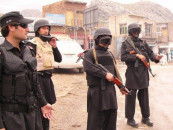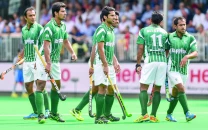‘Change in attitude must to change society’
Speakers share their stories at TED talk, 'The Way Forward', at Ziauddin University

Representational image. PHOTO: WWW.TED.COM
These views were expressed by speakers at the TED talk organised by Ziauddin University at its Clifton campus on Friday. Eight speakers from different walks of life were invited to give their two cents on what they feel is 'The Way Forward'.
Excellence Award: Youth pledge to work for society
Iffat Zafar, the cofounder and chief development officer of Sehat Kahani, a social health tech enterprise, spoke on gender and health. She highlighted the lack of health services in remote areas and the underutilisation of female physicians who due to gender biases aren't always able to practice healthcare.
From the 170,000 doctors in Pakistan, 63% are women, but only 23% female doctors actually register into medical practice, she said. Through e-health, she has been able to create a platform integrating those in need of healthcare and those licensed to offer the service. For Zaffar, the way forward is one where "healthcare is not just a privilege but a right for all".
Her sentiments of inclusiveness were echoed by Suman Valeecha and Ayesha Rahman. A youth engagement programme manager at the Indus Health Network, Rahman spoke of her project called 'Kiran Sitara' whereby young girls are trained in negotiation skills to help them access rights and change gender perceptions within their communities. The project has made significant progress in the issues of child marriage and battling tuberculosis in communities where women are largely dependent on their male relatives for access to healthcare. Young girls are a resource, not a liability, she said.
Highlighting social disparities, Valeecha, who runs the non-governmental organisation Actcept, which works with the transgender community to enable their access to better living standards, encouraged the audience to move past the gender binary and adopt a more open-minded attitude towards the transgender community which is "outright denied of existence let alone have any rights".
While she appreciated the progress made so far such as the Transgender Persons Protection Bill 2017, she reminded the audience that the law is not enough where the discrimination is systematic and inequality is faced in all spheres of life on a regular basis. Her organisation has worked on creating digital stories of transgender persons, allowing them to humanise their stories in a context where they are commonly perceived as caricatures and are ostracised by society.
Saquib Mehmood, the founder and CEO of ClimateX, took the idea of inclusiveness a step further and reminded the audience of their social responsibility towards the environment. He emphasised on the need to protect our ocean and conserve marine life, which is threatened by pollution and over fishing.
The audience was not only made aware of issues that plague our nation today but also motivated by the speakers to come up with innovative solutions for existing problems.
Muneeb Maayr, the founder of Daraz and Bykea, and Imtisal Abbasi, the managing partner of Saatchi and Saatchi, an advertising firm, highlighted the potential for innovation in the digital age, and invited the audience to think bigger and beyond conventional ways.
In contrast, Zarrar Khuhro, in 'Zara Hat Ke' fashion, reminded of the adverse effects of technology by talking about fake news and the violence it can ignite. As we share and interact in the digital world it is important to hold ourselves responsible and accountable for the information we share for as he put it, "words can in fact incite a bunch of people with actual sticks and stones to break your bones".
Burqa of Pakistan's first lady 'unmasks societal biases'
Adeel Husain, an actor, photographer and filmmaker, spoke of the power of stories and the importance of artists and creative individuals in the nations' path to progress. He brought the event where inspiring stories of progress had been shared to a neat conclusion.
In between talks, the audience was entertained by student hosts Ahad Khattak, Rabia Husain, Nosherwan Kirmani and the mind-reader Afzaal Afridi, and a musical performance by Osaid Tebrez. The event had begun with an introduction from the university's chancellor, Asim Hussain, who emphasised on the social impact of such conferences.
As Maayr put it, "The question we need to ask ourselves every day is what image of myself do I want to leave behind? What must I do, how must I create and foster an image of myself? This leaves behind a lot of accountability, have I done enough, have I left an impact?"
Published in The Express Tribune, September 30th, 2018.



















COMMENTS
Comments are moderated and generally will be posted if they are on-topic and not abusive.
For more information, please see our Comments FAQ